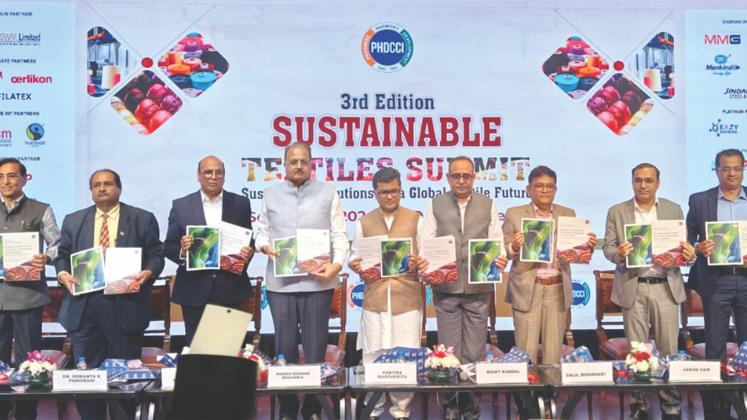
The LNJ Bhilwara Group’s flagship company, RSWM Limited, reaffirmed its commitment to sustainability by presenting its extensive Sustainability Report at the PHD Chamber of Commerce and Industry’s 3rd Sustainable Textile Summit.
The report, which highlights RSWM’s continuous dedication to environmental responsibility and sustainable textile production, was presented by Rohit Kansal, Additional Secretary, Ministry of Textiles, and Pabitra Margherita, Minister of State for Textiles.
Along with other dignitaries and business executives, Roop Rashi, the Indian Ministry of Textiles’ Textile Commissioner, was in attendance at the summit. Roop Rashi praised RSWM for their proactive commitment to sustainability. The company’s major efforts in carbon footprint reduction, circular economy practices, and innovations in green textile manufacturing are highlighted in the recently released report.
In an effort to combat the problem of plastic waste worldwide, RSWM recycles about 1,830 million PET bottles year, turning them into 51850 MT of recycled polyester fibre. This initiative promotes the production of sustainable textile products while drastically reducing trash sent to landfills. In an effort to further minimise its use of fossil fuels, RSWM uses 8,818 metric tonnes of dry husk biofuel every year.
Along with these important sustainability efforts, the company carefully adheres to Zero Liquid Discharge and has installed sophisticated multi-stage treatment plants at its facilities, saving an estimated 23,36,792 kilolitres of water annually. RSWM uses 76.5 million kilowatt-hours of green energy annually thanks to its adoption of solar and wind power in an effort to reduce its dependency on conventional energy sources.
Through a variety of energy-efficient measures, RSWM has reduced its CO2 emissions by 800,000 metric tonnes annually, demonstrating the company’s proactive attitude to climate change mitigation. Furthermore, by utilising 8,162 metric tonnes of recycled cotton annually in its production processes, RSWM promotes the sustainable use of resources in the textile sector and focusses on the upcycling of textile waste. RSWM utilises 72,357 kg of organic manure and fertilisers yearly as part of its commitment to sustainable greenery, improving soil health and lowering the environmental impact of its agricultural inputs.
B.M. Sharma, Jt. Managing Director, RSWM Ltd. said, “Our approach to sustainability extends beyond merely meeting regulatory requirements; it represents our dedication to initiating significant change within the industry. Sustainability is not just a business mandate but a core part of our culture, deeply ingrained in our operations. From decisions on whether to discard or reuse, we strive to embed sustainability into every aspect of our business.”






